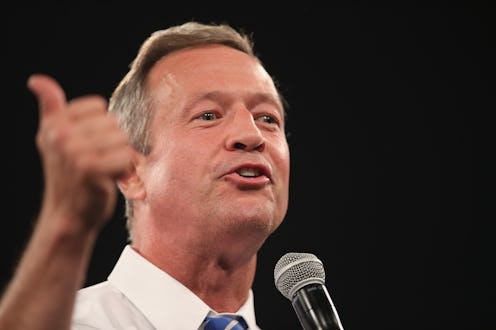News
How Can O'Malley Avoid Disaster In The Debate?
The next Democratic debate is going to be tiny. While the Republican presidential field is still roughly the size of a small nation’s military, there are only three candidates left running for the Democratic nomination: Hillary Clinton, Bernie Sanders, and Martin O’Malley. The next debate will offer O’Malley, the former Maryland governor who's currently polling at around 2 percent another chance to make a splash. It will also be a chance for him to bungle the opportunity and squander his chances at becoming president, as the last two Democratic presidential candidates did at the last debate. How can O’Malley avoid Jim Webb and Lincoln Chafee’s fate?
Let’s first revisit where Webb and Chafee went wrong. Webb has some centrist and even conservative policy views that made his candidacy an uphill climb from the start, but these had nothing to do with his failure at first Democratic debate. No, it was his petulant conduct that made him a laughing stock to Democratic voters, most notably his repeated whining about not getting “equal time” to speak. Webb complained endlessly about the lack of questions he was getting; given both his low poll numbers and astonishingly sparse presence on the campaign trail, this seemed just a tad bit entitled, certainly not very presidential, and perhaps a tad disconnected from reality.
Chafee’s problems were different, though no less crippling to his presidential ambitions. The virtually-unknown former governor of Rhode Island is 62 years old, yet there was something oddly childish and youthful about his performance — and not in a good way. Midway through the debate, he inadvertently suggested that he’d voted for a bill before reading it; when asked to explain this, he accused the moderator of “being a little rough” on him, as “my dad had died” right before the vote. That doesn’t exactly scream “presidential material."
The common thread between the two is that neither of them conducted themselves in a manner that was particularly dignified, and that’s a prerequisite for succeeding in any presidential race (At least in the Democratic Party — Donald Trump’s ascension within the GOP is another matter entirely). O’Malley’s task, then, is relatively simple: He just needs to act like an adult. That means coming across as level-headed but strong, confident but not cocky, and perhaps most of all, at ease with himself. This may sound like a low bar, but as Chafee and Webb demonstrated, it’s far from a given that every candidate can clear it.
But that’s just what O’Malley needs to do to avoid destroying his presidential chances in one fell swoop in front of millions of viewers. Actually succeeding in winning the nomination, or even putting himself in serious contention for it, is a far more difficult task, and one that he’s unlikely to accomplish solely with a strong debate performance.
In order to win the nomination, O’Malley would probably need Clinton’s campaign to suffer some sort of catastrophic collapse. Were that to happen, he could make a serious play for the nod. Yes, he’s polling well behind Sanders, but as strong as the Vermont senator’s support is, there are a whole lot of wealthy and powerful Democrats who would prefer a center-left guy like O’Malley in the oval office over someone who openly identifies as a socialist.
Make no mistake: O’Malley has a tough road ahead of him if he wants to become the 45th president of the United States. If, on the other hand, he just wants to stay in the race for a bit longer, the second Democratic debate shouldn’t be too challenging. He just needs to make clear that yes, he is one of the adults in the room.
